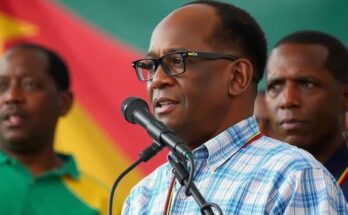Austria’s far-right Freedom Party (FPO) is projected to win the general election with 29.1% of the vote, ahead of the governing Austrian People’s Party (OVP) at 26.2%. Herbert Kickl, the FPO leader, aims to become chancellor but needs a coalition for a majority. Economic issues and immigration have dominated the campaign, reflecting similar far-right surges across Europe.
Austria’s far-right Freedom Party (FPO) is anticipated to secure victory in the forthcoming general election, positioning itself ahead of the ruling conservative faction. According to a projection from pollster Foresight, shared by broadcaster ORF, the FPO, under the leadership of Herbert Kickl, is projected to garner 29.1 percent of the votes, whereas the Austrian People’s Party (OVP), led by Chancellor Karl Nehammer, is expected to receive 26.2 percent. Meanwhile, the center-left Social Democrats are predicted to place third, accruing approximately 20.4 percent of the votes. Herbert Kickl, who has been at the helm of the FPO since 2021, is striving to become Austria’s chancellor following what would be the first far-right national electoral victory in the post-World War II era. However, to achieve this aspiration, Kickl will require a coalition partner to secure a majority in the lower house of parliament, an endeavor complicated by the reluctance of rival parties to collaborate with him. Key issues influencing the elections include economic concerns and immigration policies, which have significantly affected the support for Chancellor Nehammer’s OVP. Should the FPO emerge victorious, it would join a growing list of European Union nations experiencing a rise in far-right political support, following similar trends observed in the Netherlands, France, and Germany. The FPO, characterized by its Euroscepticism and critique of Islam, had previously marked a notable milestone by narrowly winning the national vote in June, edging out the OVP by less than a percentage point during European elections.
Austria has seen a notable increase in far-right support, mirroring trends in several other EU countries. The rise of parties like the Freedom Party reflects growing discontent among voters regarding economic conditions and immigration policies. The FPO’s historical win would signify a shift in Austria’s political landscape, being the first instance of a far-right party achieving national electoral success since World War II. This shift resonates with broader European trends where far-right parties are gaining traction in response to various socio-economic challenges and immigration debates.
The projected victory of Austria’s Freedom Party in the upcoming general election may signify a pivotal change in the country’s political sphere, furthering the trend of increasing far-right influence across Europe. Herbert Kickl’s leadership marks a significant potential shift in Austria’s governance, conditioned by the necessity of forming a coalition to assume power. As public concerns about the economy and immigration intensify, the implications of such a political shift will warrant close attention.
Original Source: www.aljazeera.com




